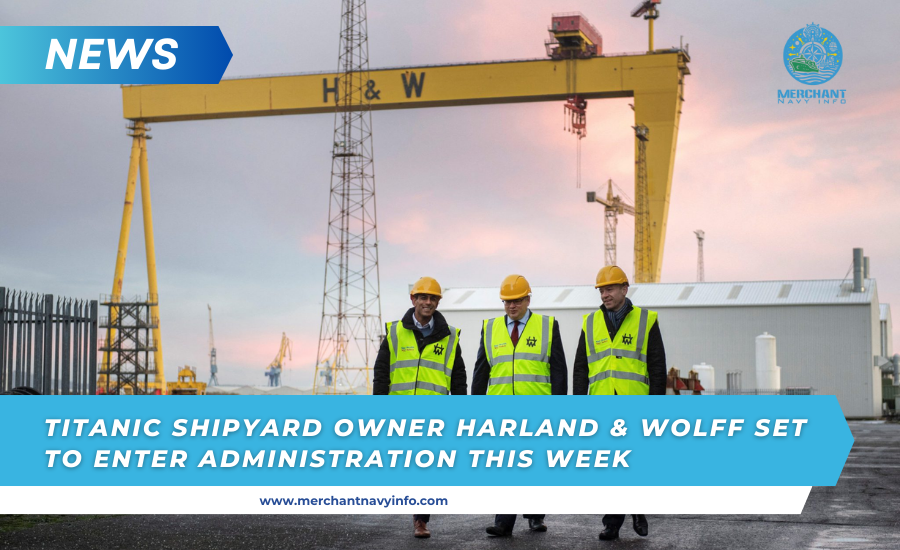
Titanic shipyard owner Harland & Wolff prepares to go into administration this week.
Titanic Shipyard Harland & Wolff has confirmed it will go into administration for the second time in five years. Teneo insolvency practitioners have been appointed directors, and some “non-essential” staff have been made redundant.
However, the company’s board said there was a “credible path” for its four shipyards to continue operating under new ownership.
The company’s main dock is in Belfast, famous for building the Titanic, with other operations in Appledore, England, and Michiel and Anish, Scotland.
Harland & Wolff, whose home ground is in Belfast, is famous for building the Titanic
The Titanic Shipyard said the administration process will be limited to the holding company Harland & Wolff Group Holdings plc, and the operating companies that run the grounds are expected to continue trading.
However, shareholders will see the value of their investment in the business completely wiped out.
What went wrong with Harland & Wolff?
H&W “remains able to deliver maritime contracts.”
The company said its non-core businesses were being liquidated.
The process has already begun with the closure of the Isles of Scilly ferry service before it starts sailing.
Other non-core businesses include a small US business and a marine services company, which will be sold with the goal of retaining 14 jobs.
A few non-essential staff and others in support roles said they would lose their jobs on Monday.
The company warned that “further redundancies may be required in our core businesses” depending on how the sale progresses.
Shipbuilding is an important part of Belfast’s industrial history
A government spokesman acknowledged that “this is a worrying time for those affected”. Still, he added that Harland & Wolff had clarified that the action would not “impact work at the shipyard or core business”.
This includes the transfer of its contracts to the Ministry of Defence.
A spokesman for the Titanic shipyard said: “We are clear that following a comprehensive review of the company’s financial position, the market today is best placed to meet these challenges and that providing government funding would represent a significant risk of losing taxpayers’ money.”
The government will work with all parties to seek an outcome that “benefits shipbuilding and manufacturing in Belfast, Scotland and across the UK and protects jobs”, the spokesman added.
‘A secure future’
The company’s chief executive, Russell Downes, said on Saturday that the basins “have a secure future both together and individually”.
“We have strong leadership across all the basins,” he said.
“We have a strong business case for the work they are currently doing and the work they expect to do in the future.
“They have funding requirements in the short term, but they will generate cash in the future. ”
Rothschild, which is managing the sale, said it had been contacted by several parties expressing interest in buying some or all of the pool. The deadline for the first round of bids is approaching.
It is understood that Spanish state-owned shipbuilder Navantia is interested in the Belfast operation.
Navantia is a lead partner in the Fleet Solid Support (FSS) project, building three Royal Navy logistics ships with Harland & Wolff as a subcontractor.
British defence contractor Babcock International is also a potential bidder for the Belfast site, Sky News reported.
Mr Downes told the BBC he hoped to reach one or more deals by the end of October.
Northern Ireland Deputy Prime Minister Emma Little Bingley said the interest in buying the company showed “the future of Harland & Wolff is very strong”.
She described it as “an iconic and hugely important company in Northern Ireland”.
Little Bingley and First Minister Michelle O’Neill said they would work with the company to find solutions to protect jobs.
The company also provided more details about its investigation into alleged “misuse” of funds by previous management.
Accountants PricewaterhouseCoopers and law firms Simmons and Simmons were appointed to investigate.
It noted that Mr Downs took the action in response to clients’ concerns about “alleged misuse of funds transfers in excess of £25m and certain other matters of lower value, such as payments of funds with little or no benefit to the business.” The company’s former chief executive, John Woods, told the Financial Times that the allegations of misappropriation were “ridiculous.”
A shipyard worker (left) cuts the MSC Naples cargo ship into pieces in the Harland & Wolff dry dock. A yellow Harland & Wolff crane is seen in the background. Getty Images
The GMB union said the shipyards were vital for “future capability”.
Matt Roberts, national officer for the GMB union, said: “Workers, their families and the community at large are now facing a life thrown into disarray by the chronic failure of the Industrial Strategy and corporate mismanagement.”
Roberts said Harland & Wolff’s four shipyards were “vital to our future sovereign capability in areas such as renewable energy and shipbuilding”.
“The government must now work to ensure that private companies are not allowed to choose which parts to keep and in which yards or contracts,” he said.Susan Fitzgerald, regional secretary of Unite Ireland, said Harland & Wolff “must do everything it can to protect its employees”.
“It is important that the right buyer is found and if not, the government must be prepared to intervene,” he said.
“Harland & Wolff employees should have confidence that Unite has their back and will do everything it can to ensure a viable long-term future for employees.”
“It is important to recognise that this is very difficult news for employees of the company directly affected and will impact many other employees across the group,” Downs said on Monday.
“Unfortunately, as we work hTitanic Shipyard To Go Into Administrationard to support our employees during this transition period, we have had to make very difficult decisions in order to protect the future of our four shipyards,” he continued.
“Obviously, this will be very unpleasant news for shareholders who have shown great commitment to the business over the past five years.”









